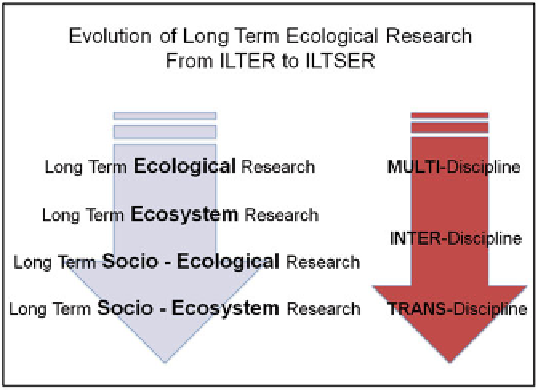Geoscience Reference
In-Depth Information
Fig. 14.1
Evolution, during the last 30 years, of the focus and epistemic tools of long-term
research, within the international scientifi c community interested in global environmental
problems
funding system which promoted either small scale studies (e.g. a few species in a
few m
2
for a 1-2 years) or large scale studies but conducted in short time (e.g. 2-3
years study of the ice or sediment cores thousands of year old). Initially, most LTER
groups were working on natural reserves, looking to extend their understanding of
ecological processes for longer periods of time (decades) and at larger scales (hect-
ares and km
2
) in a “secure” environment. The ecosystem approach followed natu-
rally when scientists from different disciplines started to work on the same place for
many years (site based research concept), accumulating the necessary knowledge to
deal with the complexity of ecological systems. The socio-ecological research
came later in order to understand the human drivers behind the transformation of
natural ecosystems and with an interest in supplying scientifi c information for
proper ecosystem management. However, the need for a transdisciplinary research
has emerged with the new socioecosystem paradigm, in which humans are not just
another species taking advantage of ecosystem services, but a complex human-
biological-physical entity that evolves into a tight integration of biophysical and
cultural components, living and non-living, at different scales.
Socioecosystem
research
requires a shift from viewing humans as external drivers of natural sys-
tems to that of agents acting within socio-ecological systems (Grimm et al.
2000
;
Redman et al.
2004
; Haberl et al.
2006
). On these grounds, a new initiative within
the LTER community has been launched as a strategic research initiative called
“Integrative Science for Society and the Environment” (ISSE), proposed to elevate
environmental science to a new level of integration, collaboration, and synthesis
necessary for addressing current and emerging environmental research challenges
(Collins et al.
2007
).

Search WWH ::

Custom Search